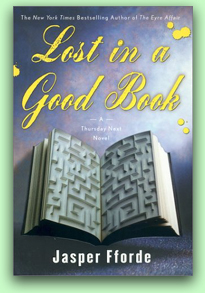
Jasper Fforde
Review by Mary Matus
I’ve always had a certain admiration for humor writers. I admire people who can pull off a string of not just funny but clever jokes and make it look easy. I’ve begun to learn from personal experience it can be tricky to make people laugh.
In Lost in A Good Book, Jasper Fforde not only makes
us laugh, he creates characters we care about and a compelling plot that
makes it hard to put the book down.
And he makes it look effortless.
Fforde’s second book continues with Spec Ops Literatec
Thursday Next dealing with the publicity of her success in The Eyre
Affair.
Fforde’s mastery of this comic world is evident from
the beginning. In the first chapter, Thursday is on a TV talk show in
what has been promised to be a “no holds barred” interview,
during which she can finally tell the entire story about her exploits
in The Eyre Affair. However, upon arriving on the set, Thursday
is so censored by her superiors she ends up spending the whole interview
discussing her pet dodo. (As common as dogs in her world.)
As in his first book, Fforde uses a bevy of literary references
that literature lovers will delight in. In order to save her husband,
Thursday must learn how to jump into books. Her trainer is one of the
most fascinating characters in literature -- Miss Havisham from Charles
Dickens’ Great Expectations. Among the other literary characters
she encounters along the way are the Cheshire Cat and the Queen of Hearts.
The book has a wealth of minor characters and several minor
subplots throughout the book. Among the plots Fforde juggles are: a rare
Shakespearean play is discovered; Thursday keeps trying to avoid the Spec
Ops public relations person Cordelia, who is intent on milking Thursday’s
publicity; Thursday’s time-jumping father keeps appearing to tell
her the future may not be looking too bright; and someone keeps trying
to kill her.
If it sounds like there’s a lot going on, there is.
Fforde seems to love keeping the story as busy as possible, but as the
book proceeds, it does get a little difficult to keep track of all the
subplots.
Although Fforde manages to tie up all the loose ends by
the end of the book, some of the endings seem rather weak. Also, at the
end Fforde tries to show how the various plots are connected. However,
it almost seems as if he was stretching for ways to connect them, because
the connections between the plots seem weak and forced.
At least one plot, the one concerning the lost Shakespearean
play, doesn’t serve much purpose in the story, and the conclusion
seems almost an afterthought.
The ending itself is very weak. While Fforde was probably
trying to find a way to keep readers anxiously awaiting the next book,
some readers may be disappointed with the lack of resolution. What he
meant to be a cliffhanger may just frustrate readers. Fforde doesn’t
have to try so hard to keep readers coming back to his books. If he continues
to write as cleverly and compellingly as he has so far, readers will keep
returning.
Penguin; ISBN: 0670031909